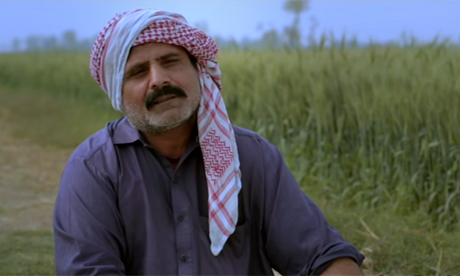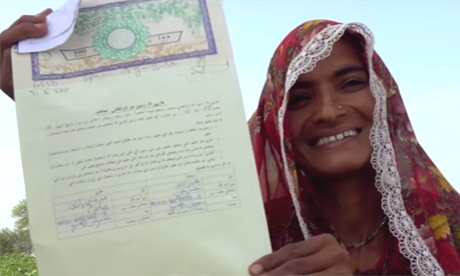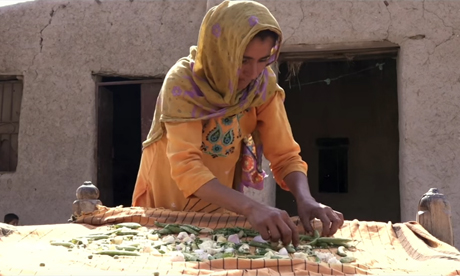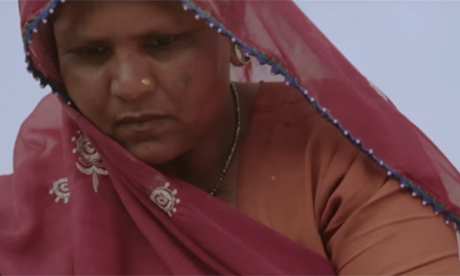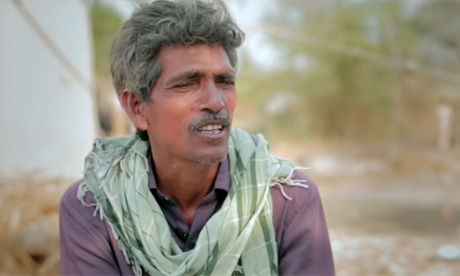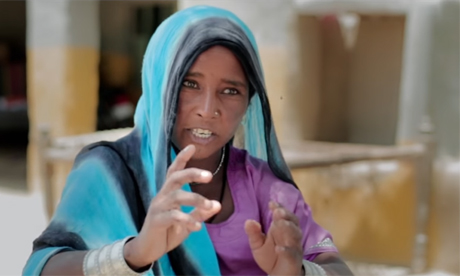FAO and UN Women: partnering for rural women and men in Pakistan
In 2010, severe flooding killed nearly 2 000 people in Pakistan and wiped out 1.6 million homes. Whole villages were submerged, and families lost not only their homes, but also their livestock and standing crops.

“We were awakened suddenly and all we could see was water all around us.” (Kaeynat, Dadu District, Sindh Province, Pakistan)
Some 2.4 million hectares of soon-to-be-harvested crops were destroyed, and estimated agriculture losses stood at USD 5.1 billion. The province of Sindh was among the hardest hit, with some 970 000 households displaced and agriculture losses of USD 2.3 billion. For the average Pakistani farming family, the disaster meant huge personal loss and growing debt – and fewer opportunities to earn a living.
A “One UN” response
In response to the floods and their after-effects, the United Nations Food and Agriculture Organization (FAO) and UN Women, together with the International Labor Organization (ILO), launched a One UN project in 2013, on “Livelihood Restoration, Protection and Sustainable Empowerment of Vulnerable Peasant Communities in Sindh.” The LRP project, as it was known, was implemented in partnership with the Planning and Development Department of the Government of Sindh, with funding from the United Nations Trust Fund for Human Security (UNTFHS).
|
“Sindh is at the tail end of Pakistan. As a child I did not know what that meant. When I grew up I realised, all it meant was floods or drought.” (Yameen, Dadu District, Sindh Province)
“For almost two months, we just sat at the road side in makeshift tents. We were completely crippled and helpless, our lives were destroyed.” (Khadim Hussain, Mirpur Khas District, Sindh Province) |
|
During the project’s three-year timeline, a total of 64 000 people in the districts of Dadu and Mirpur Khas benefitted from a series of integrated initiatives focusing on income and livelihoods restoration, skills enhancement and disaster risk reduction.
The project’s closing ceremony, held earlier this year in Islamabad, provided an opportunity to review key achievements and successes over the preceding three years. In particular, and as noted by Patrick T Evans, FAO Representative in Pakistan, FAO’s on-farm activities had helped improve agricultural production, irrigation systems and soil management.
|
“Our village received many benefits. [These included the] supply of irrigation water, seed, manure and fertilizer, goats, chickens, even machines and training, and we now grow fruits and vegetables as well. We have found new [and] reliable ways to earn a respectable livelihood...” (Yameen, Dadu District, Sindh Province) |
Land agreements
Sangeeta Thapa, Deputy Country Representative for UN Women, also highlighted the land tenancy agreements that the project had helped secure for landless farmers: some 2 400 farmers, over half of them women, signed land tenancy agreements with their landlords.
|
|
“We are very grateful to UN Women for supporting signed agreements between us and the landlords. Now we are happy and feel secure. We know that by working hard in the fields we can share in the benefits. It is fair, and even the landlord cannot say anything to us. We are very motivated to work even harder.” (Mohini, Mirpur Khas District, Sindh Province) |
|
“Previously there was no contractual agreement [with] the landlord... It was all verbal, resulting in a lot of discord and even violence. FAO ensured that we had written agreements with signatures. All expectations and responsibilities are written and all expenses and profits are calculated and distributed fairly.” (Dhanyo, Mirpur Khas District, Sindh Province) |
|
Training
Besides on-farm activities and land tenancy, the project focused on training and skills development. Some 3 000 men and women attended Farmer Field Schools and Women Open Schools, and over a thousand women and men received training in food preservation techniques for both their own consumption and for sale.
|
|
“I always wanted to have a business and now because of [the] UN Women training [in] food technology, I have a skill. I am a trained pickle maker and running a good business.” (Momal, Dadu District, Sindh Province) |
Training and other project activities also supported entrepreneurship and home-based work schemes, particularly for women. A total of 1 000 entrepreneurial men and women farmers increased their income through the establishment and operation of producer marketing groups, and over 500 entrepreneurs received micro-financing support for their businesses, while 1 532 received insurance coverage.
|
“I went for [the] UN training programme. I received training there on how to set up a business, and manage and run a business. How to bring my product to market and how to sell. It was a great help to me.” (Kaeynat, Dadu District, Sindh Province) |
|
“They trained us [in making] efficient cooking stoves. This was for many villages. Now I charge 200 rupees for making one stove. The stoves are set up at a height, so that we are protected from the smoke and also the heat.” (Champa, Mirpur Khas District, Sindh Province) |
|
|
|
“My wife received training in sewing and embroidery. Now I work in the fields and she stays at home, does her embroidery work, and also runs a small store. Before, our children could not go to school. Now they go to school, she also manages the household expenses.” (Nursing, Mirpur Khas District, Sindh Province) |
“Now I can vote...”
The project also enabled 1 270 home-based women workers to obtain their Computerized National Identity Cards, a key requirement for legal identity and access to services such as health care, social security and the right to vote.
|
“UN Women provided us [with] Insurance Cards and CNIC. With these we can get free treatment for our children in Mirpur Khas. Now I can vote, become part of any organization and even seek funds from Benazir Income Support Program.” (Ghytti, Mirpur Khas District, Sindh Province) |
|
See also:
- FAO Gender | A Journey Towards Human Security
- FAO Pakistan | FAO contribution in One UN Project helped improve the lives of 11,800 women, boys and girls in targeted districts of Sindh
- FAO in Emergencies | Pakistan floods 2010
- UN Women | Women Learn to Preserve Foods as a Means to End Hunger
- International Labour Organization | Rebuilding flood affected farmers' communities: Inspirational human stories

